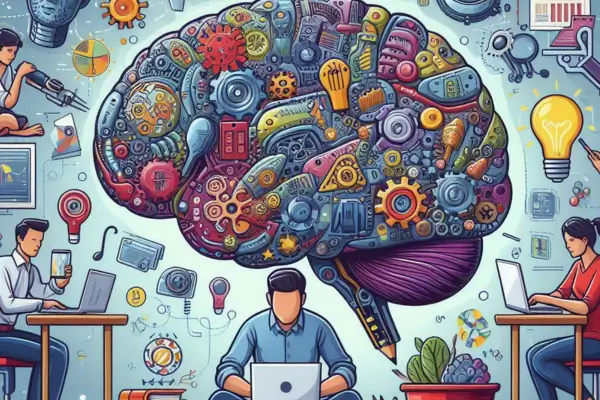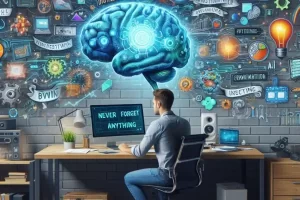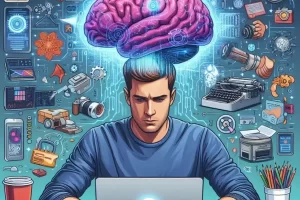Reflection is one of the most overlooked yet powerful tools for personal and professional growth. Without regular reflection, we repeat the same mistakes, lose sight of our progress, and struggle to understand what’s really driving our actions. But with a second brain and the help of artificial intelligence (AI), you can turn reflection into a structured, ongoing process that reveals insights, tracks growth, and supports intentional living.
In this article, you’ll learn how to use your second brain and AI to create a reflection system that helps you learn from your experiences, clarify your direction, and grow continuously — without burnout or confusion.
Why Reflection Matters in a Fast-Paced World
In today’s productivity-driven culture, we often:
- Move from task to task without reviewing outcomes
- Focus on doing, not learning
- Accumulate experiences but don’t extract wisdom
- Lose track of what’s working (or not working) in our routines, goals, and mindset
Reflection creates the space to:
- Learn from your past
- Realign with your values
- Adjust course with clarity
- Celebrate progress and reframe setbacks
- Make decisions with deeper self-awareness
With a second brain and AI, you make reflection efficient, consistent, and actionable.
Create a Reflection Journal or Dashboard in Your Second Brain
Use Notion, Obsidian, or Tana to build a dedicated space for reflection.
Include:
- 🗓️ Daily, weekly, monthly, and quarterly templates
- 🎯 Prompts for mindset, goals, habits, and emotional state
- 📈 Trackers for progress and insights
- 📌 Tags by topic (health, business, relationships, creativity)
- 🔁 Space to link reflections to tasks, notes, or projects
Let AI help you:
“Build a weekly reflection template focused on energy, emotions, and execution.”
“Summarize today’s notes and generate a reflection entry.”
“Suggest themes I should reflect on based on recent journal entries.”
This gives your thoughts a home and a structure.
Use Smart Prompts for Meaningful Reflection
Effective reflection starts with great questions. Use prompts like:
- What gave me energy this week? What drained it?
- What went well, and why?
- What did I avoid, and what does that reveal?
- What would I repeat, change, or stop doing?
- What did I learn about myself this month?
- Am I living in alignment with my values?
Ask AI to generate personalized prompts:
“Create 5 reflection questions for someone building a creative business.”
“What should I ask myself after a challenging conversation?”
“Suggest monthly reflection prompts for mindset and growth.”
Now your reflections have depth and variety, without guesswork.
Tag and Organize Reflections for Future Insight
Instead of leaving your thoughts scattered across entries, build a reviewable archive.
Tag entries by:
- Topic (focus, confidence, fear, motivation)
- Domain (work, health, relationships)
- Mood or emotion
- Lessons or breakthroughs
Let AI support:
“Tag these entries by emotional tone and recurring topics.”
“Group all reflections related to burnout and rest.”
“Summarize all journal entries from this month focused on confidence.”
You’ll build a searchable database of personal growth.
Review Past Reflections With AI Assistance
Growth happens when you revisit your own thinking.
Use AI to:
“Summarize what I’ve been struggling with over the past 30 days.”
“What progress have I made in how I think about focus and discipline?”
“Compare my mindset in January to today.”
“What beliefs keep showing up in my reflections that might be limiting me?”
This reveals:
- Patterns
- Blind spots
- Identity shifts
- Moments of breakthrough
It’s like having a personal coach who remembers everything you’ve processed.
Link Reflections to Action
The best reflections lead to behavioral change.
For each entry, consider:
- What’s the insight?
- What behavior does this insight suggest?
- What new habit or decision would align with this insight?
- How will I act on this — and when?
Use AI to help:
“Extract 3 action steps from this week’s reflections.”
“What themes in my journal suggest new habits to test?”
“Based on my recent entries, what’s one small change I could make tomorrow?”
Reflection becomes a launchpad for growth, not just a mental exercise.
Reflect Creatively — Not Just Logically
Don’t limit yourself to bullet points. Use your second brain to reflect through:
- ✍️ Freewriting
- 🎨 Visual mind maps or sketches
- 🎤 Voice notes
- 📷 Photo or memory capture
- 📚 Quotes and prompts that spark emotion
AI can support alternative styles:
“Turn this voice note into a journal entry.”
“Suggest a metaphor or story that captures this reflection.”
“What quote could inspire deeper insight around this theme?”
Now reflection becomes personal, expressive, and authentic.
Build a Reflection Habit That Evolves
Make reflection a part of your rhythm — not just something you do during burnout or crisis.
Start small:
- 5-minute daily wind-down
- 15-minute Sunday review
- 30-minute monthly growth check-in
- Quarterly identity and goal alignment
Ask AI to:
“Generate a weekly reflection recap every Sunday morning.”
“Remind me to reflect on my goals on the last Friday of each month.”
“Create a journaling ritual I can stick to, even on busy days.”
Consistency is more important than complexity. Over time, you’ll develop a living record of who you are becoming.
Real-Life Example: The Intentional Leader
You’re leading a small business while navigating personal development.
Your second brain includes:
- Daily micro-reflections using prompts like “What did I learn today?”
- AI-generated weekly summaries highlighting leadership wins and emotional patterns
- A monthly deep-dive on values, direction, and personal challenges
- Tags to organize insights about team dynamics, confidence, and creative energy
- Reflections that are reviewed before key decisions, launches, or pivots
You’re not just reacting to life — you’re learning from it continuously.
Final Thoughts: Reflection Is How You Become Your Next Version
In a noisy world, reflection is how you listen to yourself. With a second brain and AI, you build a system that:
- Captures your truth
- Shows your patterns
- Supports your transformation
- Turns experience into insight — and insight into action
You’re already growing. Now, reflect on it. Track it. Honor it.
And use your second brain to become the most intentional version of yourself.




